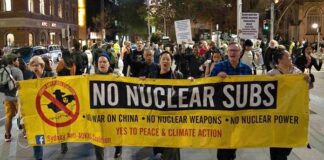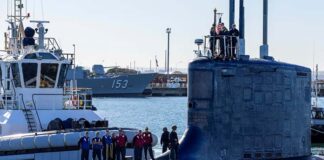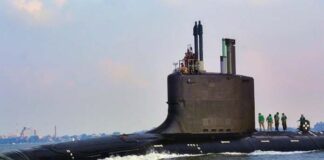Nightmares like AUKUS tend to come wrapped in two different covers. The first is an outrageous bill—in this case $368 billion and rising. Eye-wateringly expensive, the grand total should also include $9 billion to be transferred to the US and the UK to help with their current domestic submarine production difficulties.
The second is equally outrageous claims made for the jobs and regional development opportunities that the monster will apparently provide for areas that need them, like Port Adelaide Enfield.
In 2021 The Australian claimed that the jobs potential was “astronomical”. Anthony Albanese claimed it would have the same impact as the car industry in the post-Second World War period!
Trying to disguise the embrace of of US defence policy with the “promise” of jobs cannot be allowed to succeed.
A government report, extracted under Freedom of Information by Rex Patrick, acknowledged that the project would require only 1400-2500 civilian workers. Spread over more than a quarter of a century, this is not hugely impressive. Furthermore, as Professor John Quiggin pointed out, at current estimates that works out at roughly $18 million per job.
Roll out the Barrow?
Albanese was talking in Barrow, in north-west England, home of British AUKUS manufacturing and a town that has been building submarines for about 60 years.
Osborne in Port Adelaide will, in theory, be the production base for the nuclear subs here. It is doing it tough, being one of the least well-off local government areas in South Australia. But so, too, is Barrow and 60 years of submarine production haven’t changed that.
In 2023 the Financial Times, in reporting the Barrow case, provided the first hint that building submarines has not been an unalloyed positive for the Cumbrian town.
The prospect of steady long-term investment building the new AUKUS submarines promised a “reprieve from the ‘feast or famine’ cycle that has historically dogged submarine manufacturing in the UK”, it claimed.
The town itself has experienced long term steady population decline. Barrow in 2020 was the 146th non-metropolitan district in England (of 181 total) when ordered by GDP.
Furthermore, as Bob Carr reported in the Sydney Morning Herald, Barrow has struggled to deliver both the Astute and Dreadnought class submarines, even before the AUKUS class transpires.
Even the region’s Local Enterprise Partnership acknowledged that the submarine base had very few links into the local economy.
What has AUKUS sunk?
While the government is spending more than $368 billion on nuclear submarines, we are facing a climate crisis.
Instead of wasting billions training people in the skills needed to produce weapons of death, we desperately need hundreds of thousands of trained, skilled, well-paid workers to power the renewable industries, the energy infrastructure, and the work retrofitting houses we urgently need.
We need thousands of people to build the recycling industries vital to dealing with millions of used solar panels, lithium batteries and wind farm towers.
Furthermore, universities currently competing with each other for the nuclear dollar is no answer to the challenges that we must confront.
Anti-AUKUS
But just because delays in the US and UK and huge technical difficulties mean AUKUS nuclear submarines may not ever appear in Australian construction yards does not mean we can relax.
AUKUS will be used as a stalking horse to argue for nuclear waste dumps and nuclear power stations. Even if the subs never transpire, AUKUS is an integral part of the move, as The Economist pointed out, to turn Australia into America’s military launchpad in Asia.
To be anti-AUKUS is to be opposed to the new Cold War—but we also need to be in favour of huge investment in jobs and training in renewable industries, clean energy and recycling. These jobs would be spread around the regions not just centred in cities.
A recent community anti-AUKUS meeting in Port Adelaide Enfield must become part of building that movement in Australia. We need workers and their communities in the forefront of the fight for Jobs for Life, not Jobs for Death.
By Al Rainnie





